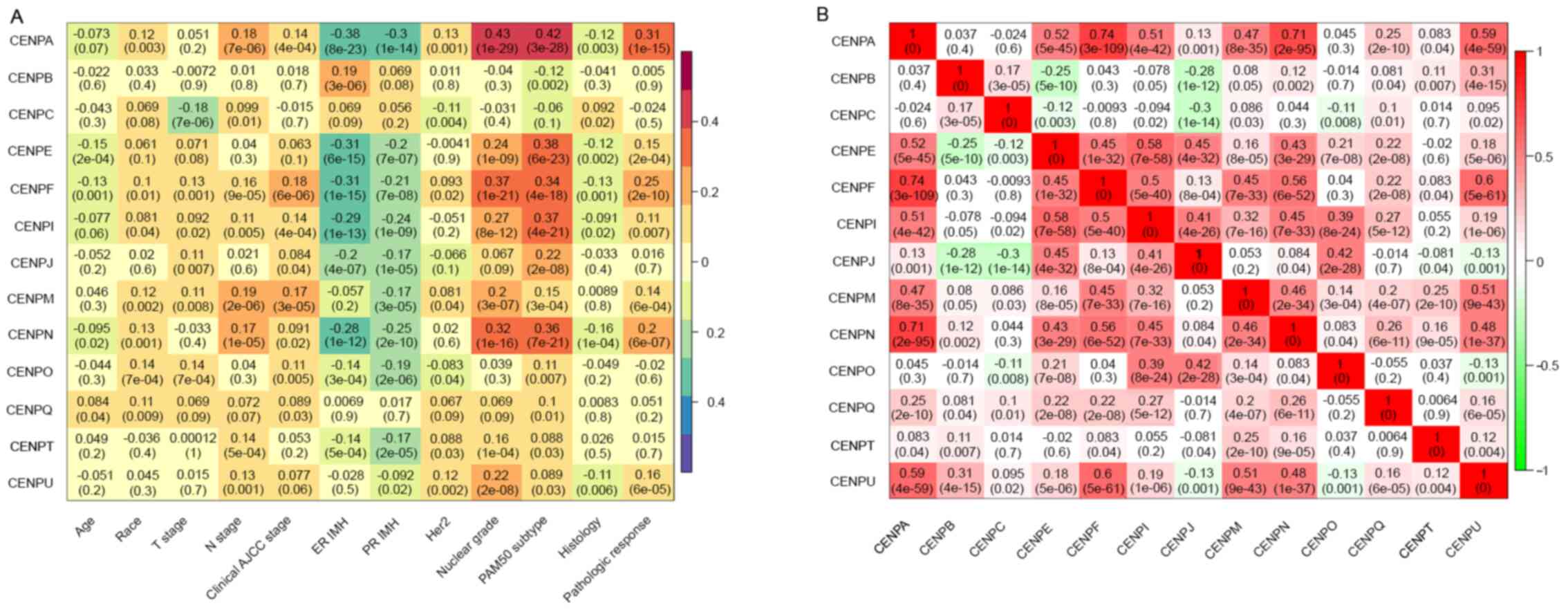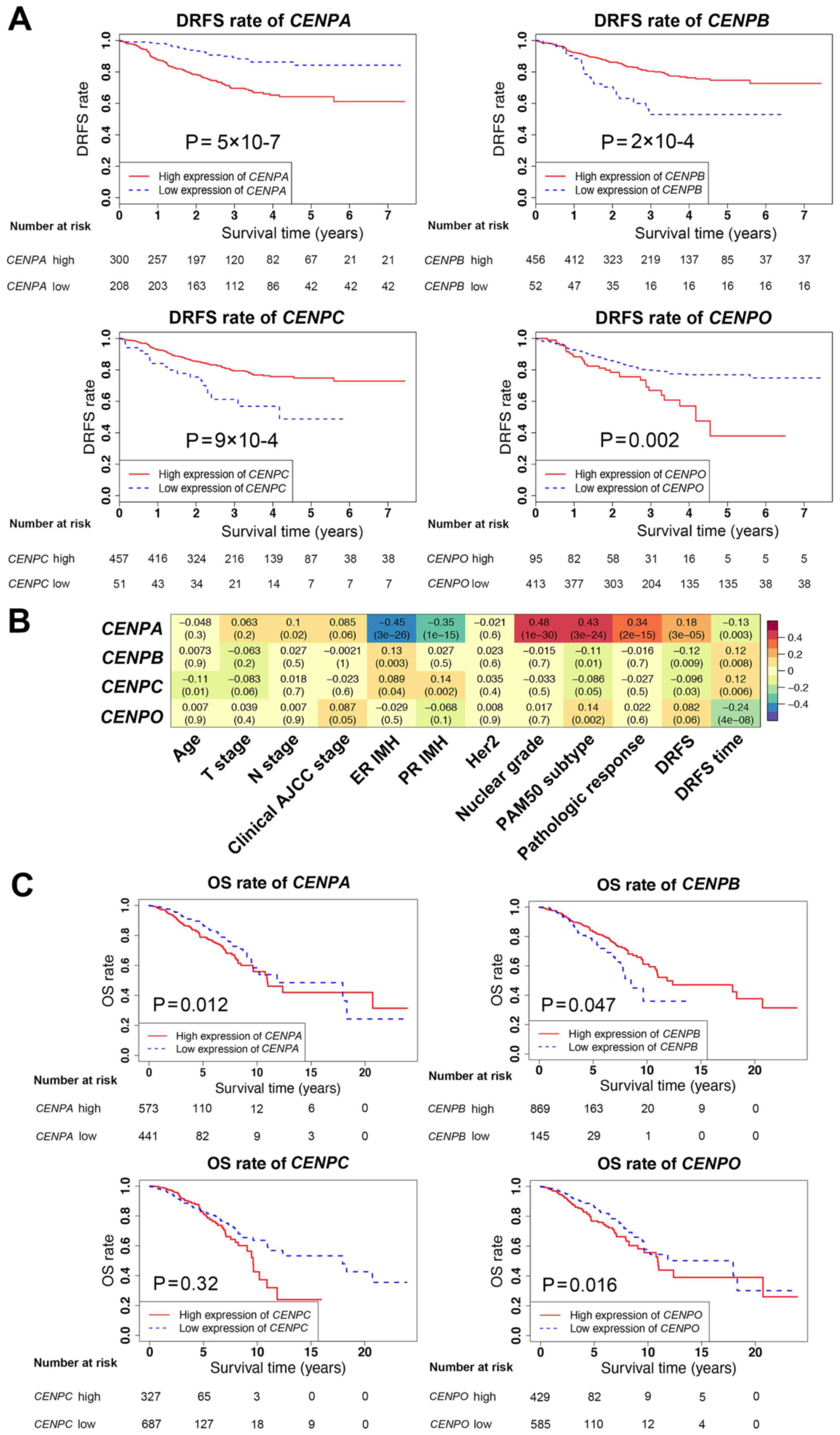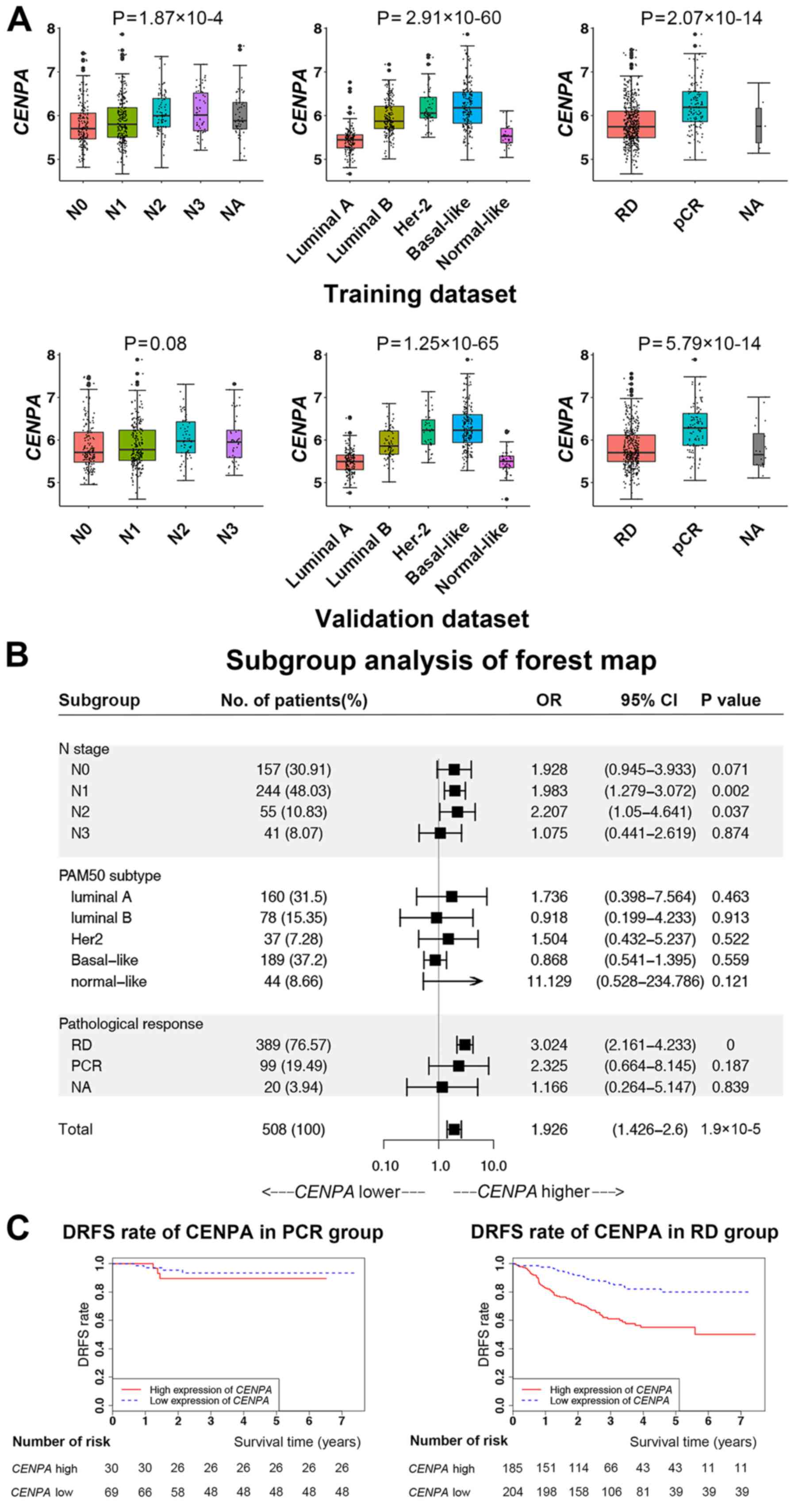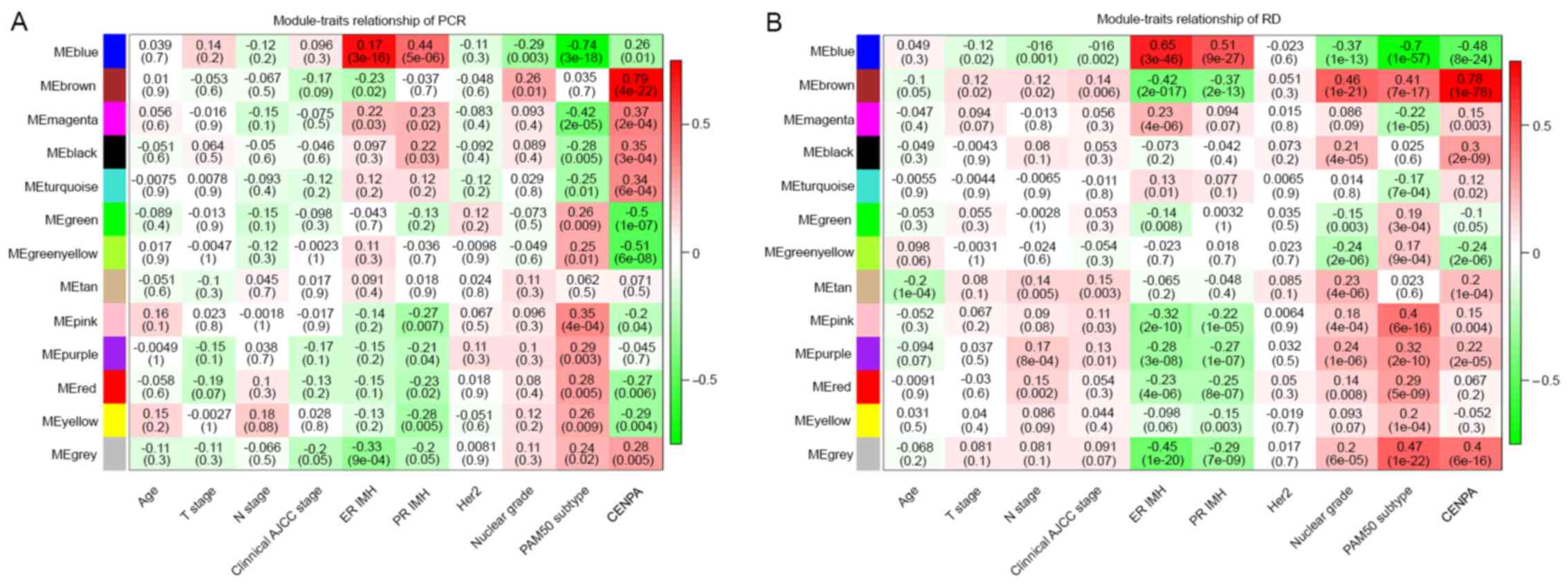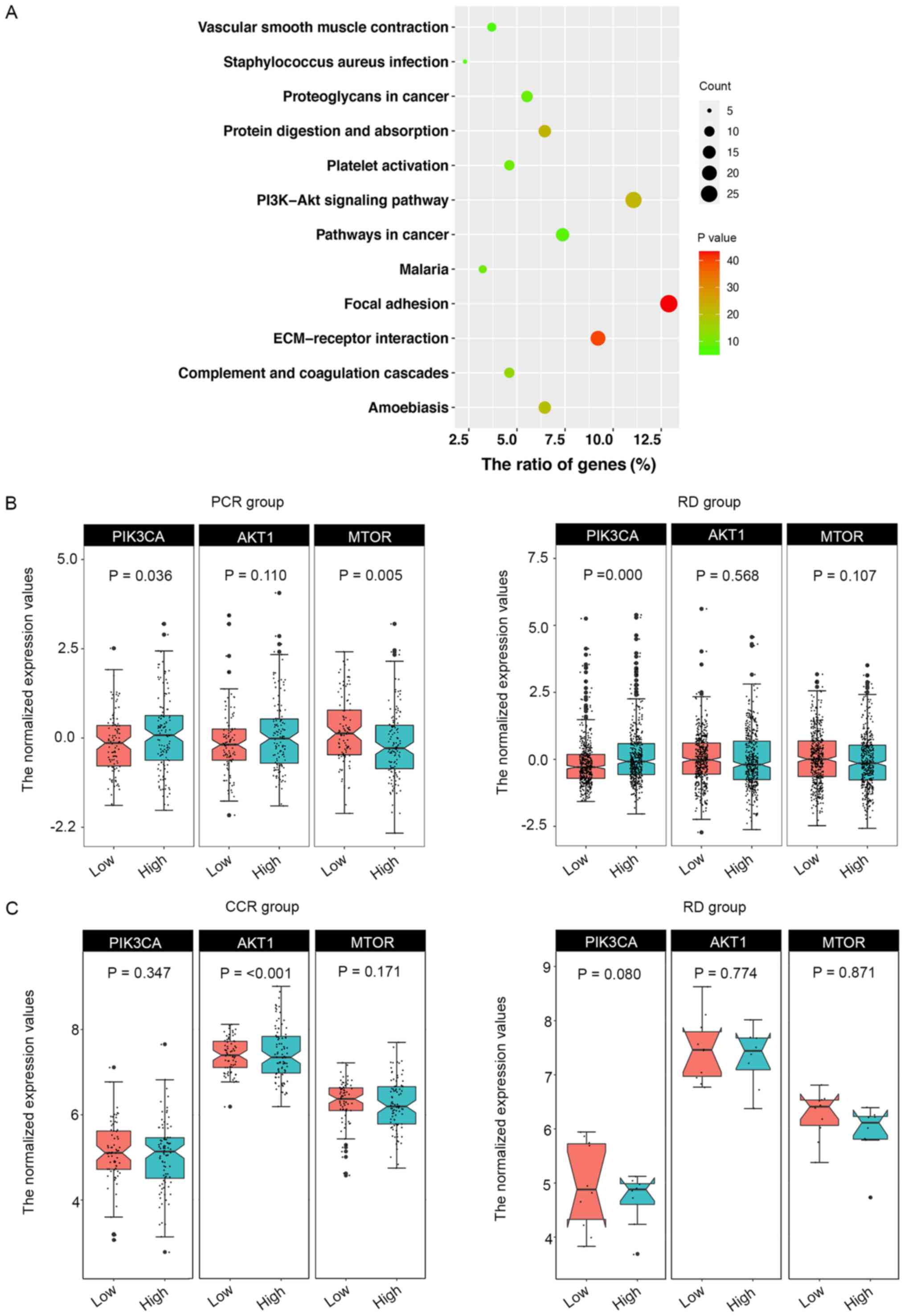|
1
|
Bray F, Ferlay J, Soerjomataram I, Siegel
RL, Torre LA and Jemal A: Global cancer statistics 2018: GLOBOCAN
estimates of incidence and mortality worldwide for 36 cancers in
185 countries. CA Cancer J Clin. 68:394–424. 2018. View Article : Google Scholar : PubMed/NCBI
|
|
2
|
Owrang M, Copeland RL Jr, Ricks-Santi LJ,
Gaskins M, Beyene D, Dewitty RL Jr and Kanaan YM: Breast cancer
prognosis for young patients. In Vivo. 31:661–668. 2017. View Article : Google Scholar : PubMed/NCBI
|
|
3
|
Fan L, Strasser-Weippl K, Li JJ, St Louis
J, Finkelstein DM, Yu KD, Chen WQ, Shao ZM and Goss PE: Breast
cancer in China. Lancet Oncol. 15:e279–e289. 2014. View Article : Google Scholar : PubMed/NCBI
|
|
4
|
Anderson MK and Matey L: Overview of
cancer and cancer treatment. Chemotherapy and Immunotherapy
Guidelines and Recommendations for Practice. Olsen MM, LeFebvre KB
and Brassil KJ: Oncology Nursing Society; Pittsburgh, PA: pp.
25–50. 2019
|
|
5
|
Liu LY, Wang F, Yu LX, Ma ZB, Zhang Q, Gao
DZ, Li YY, Li L, Zhao ZT and Yu ZG: Breast cancer awareness among
women in Eastern China: A cross-sectional study. BMC Public Health.
14:10042014. View Article : Google Scholar : PubMed/NCBI
|
|
6
|
Kaufmann SH and Earnshaw WC: Induction of
apoptosis by cancer chemotherapy. Exp Cell Res. 256:42–49. 2000.
View Article : Google Scholar : PubMed/NCBI
|
|
7
|
Yoda K, Ando S, Morishita S, Houmura K,
Hashimoto K, Takeyasu K and Okazaki T: Human centromere protein A
(CENP-A) can replace histone H3 in nucleosome reconstitution in
vitro. Proc Natl Acad Sci USA. 97:7266–7271. 2000. View Article : Google Scholar : PubMed/NCBI
|
|
8
|
Fachinetti D, Han JS, McMahon MA, Ly P,
Abdullah A, Wong AJ and Cleveland DW: DNA Sequence-specific binding
of CENP-B enhances the fidelity of human centromere function. Dev
Cell. 33:314–327. 2015. View Article : Google Scholar : PubMed/NCBI
|
|
9
|
Tanaka K, Chang HL, Kagami A and Watanabe
Y: CENP-C functions as a scaffold for effectors with essential
kinetochore functions in mitosis and meiosis. Dev Cell. 17:334–343.
2009. View Article : Google Scholar : PubMed/NCBI
|
|
10
|
Popovici V, Chen W, Gallas BG, Hatzis C,
Shi W, Samuelson FW, Nikolsky Y, Tsyganova M, Ishkin A, Nikolskaya
T, et al: Effect of training-sample size and classification
difficulty on the accuracy of genomic predictors. Breast Cancer
Res. 12:R52010. View Article : Google Scholar : PubMed/NCBI
|
|
11
|
Shi L, Campbell G, Jones WD, Campagne F,
Wen Z, Walker SJ, Su Z, Chu TM, Goodsaid FM, Pusztai L, et al: The
MicroArray quality control (MAQC)-II study of common practices for
the development and validation of microarray-based predictive
models. Nat Biotechnol. 28:827–838. 2010. View Article : Google Scholar : PubMed/NCBI
|
|
12
|
Tabchy A, Valero V, Vidaurre T, Lluch A,
Gomez H, Martin M, Qi Y, Barajas-Figueroa LJ, Souchon E, Coutant C,
et al: Evaluation of a 30-gene paclitaxel, fluorouracil,
doxorubicin, and cyclophosphamide chemotherapy response predictor
in a multicenter randomized trial in breast cancer. Clin Cancer
Res. 16:5351–5361. 2010. View Article : Google Scholar : PubMed/NCBI
|
|
13
|
Iwamoto T, Bianchini G, Booser D, Qi Y,
Coutant C, Shiang CY, Santarpia L, Matsuoka J, Hortobagyi GN,
Symmans WF, et al: Gene pathways associated with prognosis and
chemotherapy sensitivity in molecular subtypes of breast cancer. J
Natl Cancer Inst. 103:264–272. 2011. View Article : Google Scholar : PubMed/NCBI
|
|
14
|
Itoh M, Iwamoto T, Matsuoka J, Nogami T,
Motoki T, Shien T, Taira N, Niikura N, Hayashi N, Ohtani S, et al:
Estrogen receptor (ER) mRNA expression and molecular subtype
distribution in ER-negative/progesterone receptor-positive breast
cancers. Breast Cancer Res Treat. 143:403–409. 2014. View Article : Google Scholar : PubMed/NCBI
|
|
15
|
Hatzis C, Pusztai L, Valero V, Booser DJ,
Esserman L, Lluch A, Vidaurre T, Holmes F, Souchon E, Wang H, et
al: A genomic predictor of response and survival following
taxane-anthracycline chemotherapy for invasive breast cancer. JAMA.
305:1873–1881. 2011. View Article : Google Scholar : PubMed/NCBI
|
|
16
|
Colomer R, Aranda-Lopez I, Albanell J,
García-Caballero T, Ciruelos E, López-García MÁ, Cortés J, Rojo F,
Martín M and Palacios-Calvo J: Biomarkers in breast cancer: A
consensus statement by the Spanish Society of Medical Oncology and
the Spanish Society of Pathology. Clin Transl Oncol. 20:815–826.
2018. View Article : Google Scholar : PubMed/NCBI
|
|
17
|
Kim JY, Lim JE, Jung HH, Cho SY, Cho EY,
Lee SK, Yu JH, Lee JE, Kim SW, Nam SJ, et al: Validation of the new
AJCC eighth edition of the TNM classification for breast cancer
with a single-center breast cancer cohort. Breast Cancer Res Treat.
171:737–745. 2018. View Article : Google Scholar : PubMed/NCBI
|
|
18
|
Parker JS, Mullins M, Cheang MC, Leung S,
Voduc D, Vickery T, Davies S, Fauron C, He X, Hu Z, et al:
Supervised risk predictor of breast cancer based on intrinsic
subtypes. J Clin Oncol. 27:1160–1167. 2009. View Article : Google Scholar : PubMed/NCBI
|
|
19
|
Gendoo DM, Ratanasirigulchai N, Schroder
MS, Paré L, Parker JS, Prat A and Haibe-Kains B: Genefu: An
R/Bioconductor package for computation of gene expression-based
signatures in breast cancer. Bioinformatics. 32:1097–1099. 2016.
View Article : Google Scholar : PubMed/NCBI
|
|
20
|
R Core Team (2014), . R: A language and
environment for statistical computing. R Foundation for Statistical
Computing; Vienna: Available from:. http://www.R-project.org/
|
|
21
|
Langfelder P and Horvath S: WGCNA: An R
package for weighted correlation network analysis. BMC
Bioinformatics. 9:5592008. View Article : Google Scholar : PubMed/NCBI
|
|
22
|
Maag JL: gganatogram: An R package for
modular visualisation of anatograms and tissues based on ggplot2.
F1000Res. 7:15762018. View Article : Google Scholar : PubMed/NCBI
|
|
23
|
Godone RL, Leitao GM, Araujo NB,
Castelletti CH, Lima-Filho JL and Martins DB: Clinical and
molecular aspects of breast cancer: Targets and therapies. Biomed
Pharmacother. 106:14–34. 2018. View Article : Google Scholar : PubMed/NCBI
|
|
24
|
Bloom K and Costanzo V: Centromere
Structure and Function. Prog Mol Subcell Biol. 56:515–539. 2017.
View Article : Google Scholar : PubMed/NCBI
|
|
25
|
McGovern SL, Qi Y, Pusztai L, Symmans WF
and Buchholz TA: Centromere protein-A, an essential centromere
protein, is a prognostic marker for relapse in estrogen
receptor-positive breast cancer. Breast Cancer Res. 14:R722012.
View Article : Google Scholar : PubMed/NCBI
|
|
26
|
Cao Y, Xiong J, Li Z, Zhang G, Tu Y, Wang
L and Jie Z: CENPO expression regulates gastric cancer cell
proliferation and is associated with poor patient prognosis. Mol
Med Rep. 20:3661–3670. 2019.PubMed/NCBI
|
|
27
|
Xu C, Guo Z, Zhao C, Zhang X and Wang Z:
Potential mechanism and drug candidates for sepsis-induced acute
lung injury. Exp Ther Med. 15:4689–4696. 2018.PubMed/NCBI
|
|
28
|
Athwal RK, Walkiewicz MP, Baek S, Fu S,
Bui M, Camps J, Ried T, Sung MH and Dalal Y: CENP-A nucleosomes
localize to transcription factor hotspots and subtelomeric sites in
human cancer cells. Epigenetics Chromatin. 8:22015. View Article : Google Scholar : PubMed/NCBI
|
|
29
|
Sun X, Clermont PL, Jiao W, Helgason CD,
Gout PW, Wang Y and Qu S: Elevated expression of the centromere
protein-A(CENP-A)-encoding gene as a prognostic and predictive
biomarker in human cancers. Int J Cancer. 139:899–907. 2016.
View Article : Google Scholar : PubMed/NCBI
|
|
30
|
Liu R, Zhang W, Liu ZQ and Zhou HH:
Associating transcriptional modules with colon cancer survival
through weighted gene co-expression network analysis. BMC Genomics.
18:3612017. View Article : Google Scholar : PubMed/NCBI
|
|
31
|
Gu XM, Fu J, Feng XJ, Huang X, Wang SM,
Chen XF, Zhu MH and Zhang SH: Expression and prognostic relevance
of centromere protein A in primary osteosarcoma. Pathol Res Pract.
210:228–233. 2014. View Article : Google Scholar : PubMed/NCBI
|
|
32
|
Yang XR, Xiong Y, Duan H and Gong RR:
Identification of genes associated with methotrexate resistance in
methotrexate-resistant osteosarcoma cell lines. J Orthop Surg Res.
10:1362015. View Article : Google Scholar : PubMed/NCBI
|
|
33
|
Liu WT, Wang Y, Zhang J, Ye F, Huang XH,
Li B and He QY: A novel strategy of integrated microarray analysis
identifies CENPA, CDK1 and CDC20 as a cluster of diagnostic
biomarkers in lung adenocarcinoma. Cancer Lett. 425:43–53. 2018.
View Article : Google Scholar : PubMed/NCBI
|
|
34
|
Qiu JJ, Guo JJ, Lv TJ, Jin HY, Ding JX,
Feng WW, Zhang Y and Hua KQ: Prognostic value of centromere
protein-A expression in patients with epithelial ovarian cancer.
Tumour Biol. 34:2971–2975. 2013. View Article : Google Scholar : PubMed/NCBI
|
|
35
|
Zhang C, Han Y, Huang H, Min L, Qu L and
Shou C: Integrated analysis of expression profiling data identifies
three genes in correlation with poor prognosis of triple-negative
breast cancer. Int J Oncol. 44:2025–2033. 2014. View Article : Google Scholar : PubMed/NCBI
|
|
36
|
Zhao X and Guan JL: Focal adhesion kinase
and its signaling pathways in cell migration and angiogenesis. Adv
Drug Deliv Rev. 63:610–615. 2011. View Article : Google Scholar : PubMed/NCBI
|
|
37
|
Alfieri R, Giovannetti E, Bonelli M and
Cavazzoni A: New treatment opportunities in phosphatase and tensin
homolog (PTEN)-deficient tumors: Focus on PTEN/Focal adhesion
kinase pathway. Front Oncol. 7:1702017. View Article : Google Scholar : PubMed/NCBI
|
|
38
|
Lukashev ME and Werb Z: ECM signalling:
Orchestrating cell behaviour and misbehaviour. Trends Cell Biol.
8:437–441. 1998. View Article : Google Scholar : PubMed/NCBI
|
|
39
|
Huan JL, Gao X, Xing L, Qin XJ, Qian HX,
Zhou Q and Zhu L: Screening for key genes associated with invasive
ductal carcinoma of the breast via microarray data analysis. Genet
Mol Res. 13:7919–7925. 2014. View Article : Google Scholar : PubMed/NCBI
|
|
40
|
Schwertfeger KL, Cowman MK, Telmer PG,
Turley EA and McCarthy JB: Hyaluronan, inflammation, and breast
cancer progression. Front Immunol. 6:2362015. View Article : Google Scholar : PubMed/NCBI
|
|
41
|
Tolg C, McCarthy JB, Yazdani A and Turley
EA: Hyaluronan and RHAMM in wound repair and the ‘cancerization’ of
stromal tissues. Biomed Res Int. 2014:1039232014. View Article : Google Scholar : PubMed/NCBI
|
|
42
|
Paplomata E and O'Regan R: The
PI3K/AKT/mTOR pathway in breast cancer: Targets, trials and
biomarkers. Ther Adv Med Oncol. 6:154–166. 2014. View Article : Google Scholar : PubMed/NCBI
|
|
43
|
Ersahin T, Tuncbag N and Cetin-Atalay R:
The PI3K/AKT/mTOR interactive pathway. Mol Biosyst. 11:1946–1954.
2015. View Article : Google Scholar : PubMed/NCBI
|
|
44
|
McKenna M, McGarrigle S and Pidgeon GP:
The next generation of PI3K-Akt-mTOR pathway inhibitors in breast
cancer cohorts. Biochim Biophys Acta Rev Cancer. 1870:185–197.
2018. View Article : Google Scholar : PubMed/NCBI
|
|
45
|
Corti F, Nichetti F, Raimondi A, Niger M,
Prinzi N, Torchio M, Tamborini E, Perrone F, Pruneri G, Di
Bartolomeo M, et al: Targeting the PI3K/AKT/mTOR pathway in biliary
tract cancers: A review of current evidences and future
perspectives. Cancer Treat Rev. 72:45–55. 2019. View Article : Google Scholar : PubMed/NCBI
|
|
46
|
McAuliffe PF, Meric-Bernstam F, Mills GB
and Gonzalez-Angulo AM: Deciphering the role of PI3K/Akt/mTOR
pathway in breast cancer biology and pathogenesis. Clin Breast
Cancer. 10 (Suppl 3):S59–S65. 2010. View Article : Google Scholar : PubMed/NCBI
|
|
47
|
LoRusso PM: Inhibition of the
PI3K/AKT/mTOR Pathway in Solid Tumors. J Clin Oncol. 34:3803–3815.
2016. View Article : Google Scholar : PubMed/NCBI
|
|
48
|
Lee JJ, Loh K and Yap YS: PI3K/Akt/mTOR
inhibitors in breast cancer. Cancer Biol Med. 12:342–354.
2015.PubMed/NCBI
|















